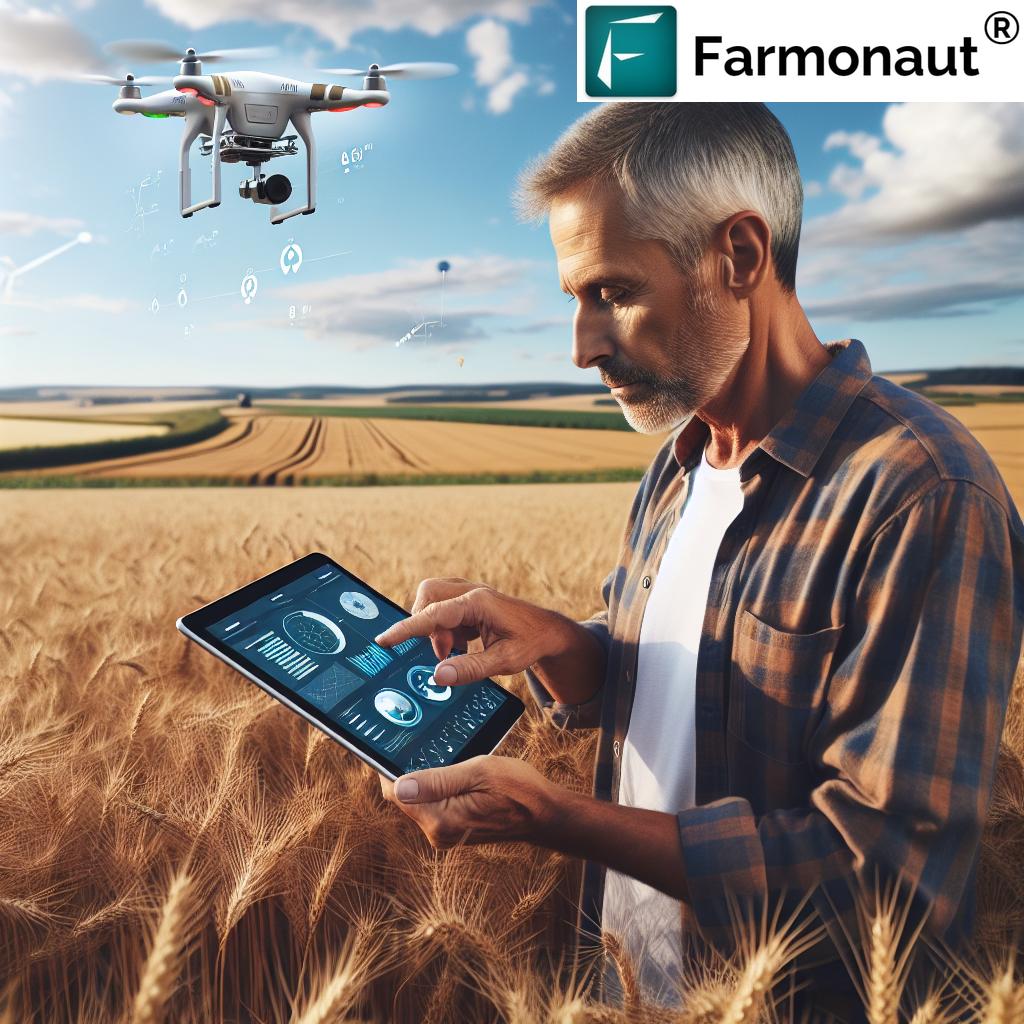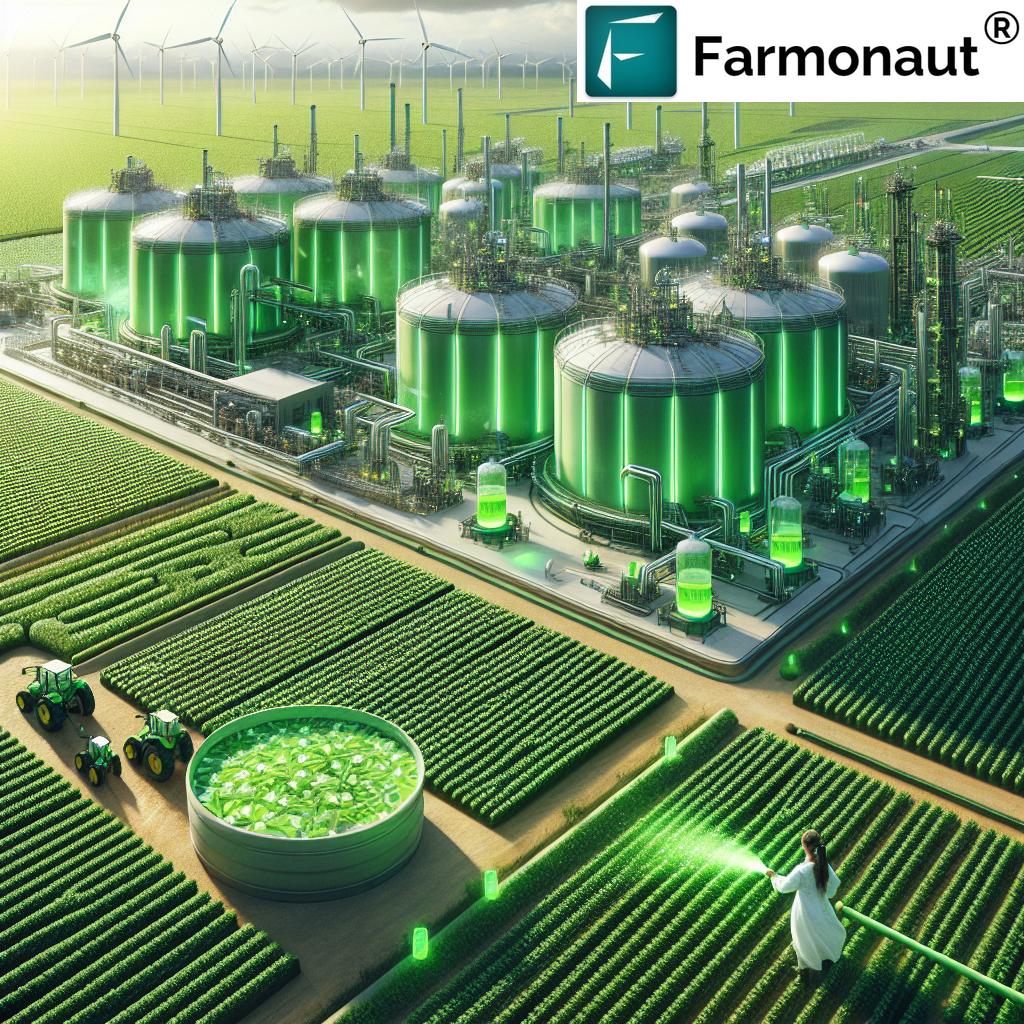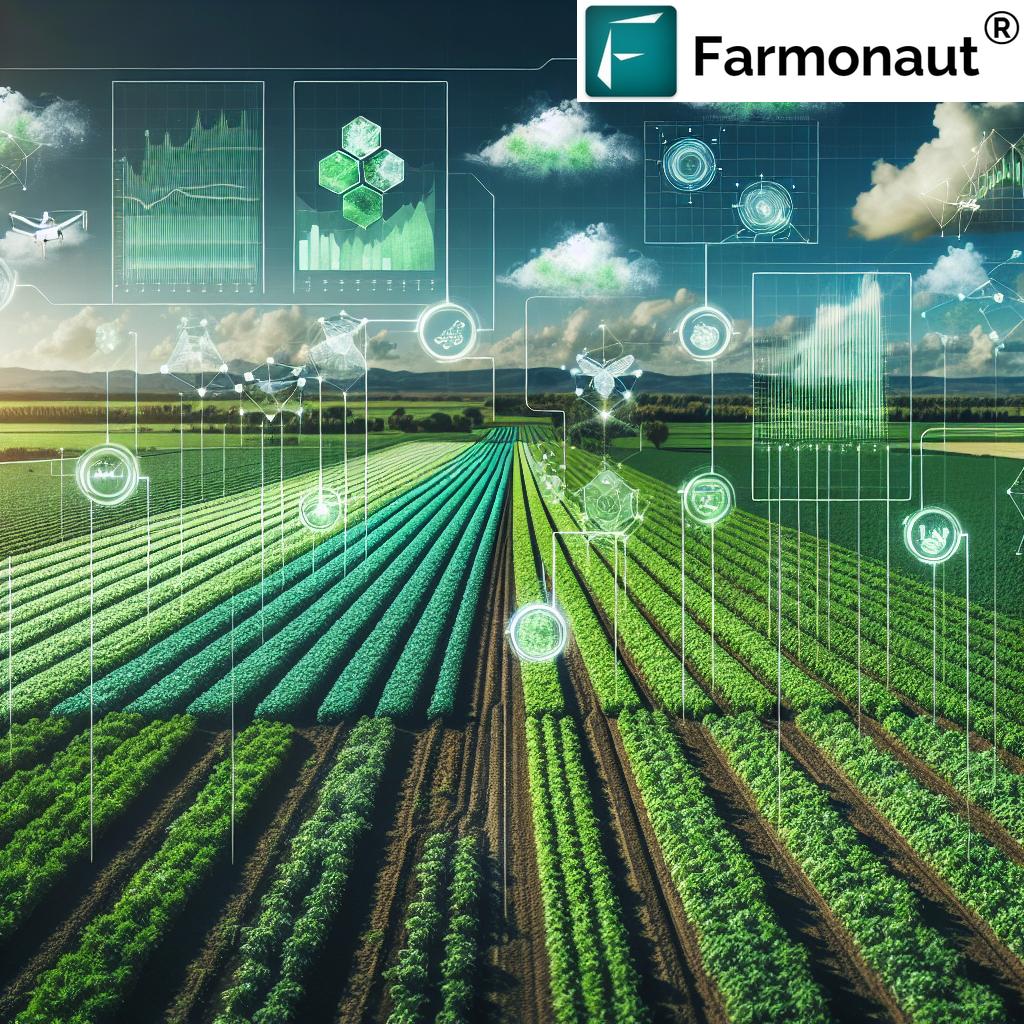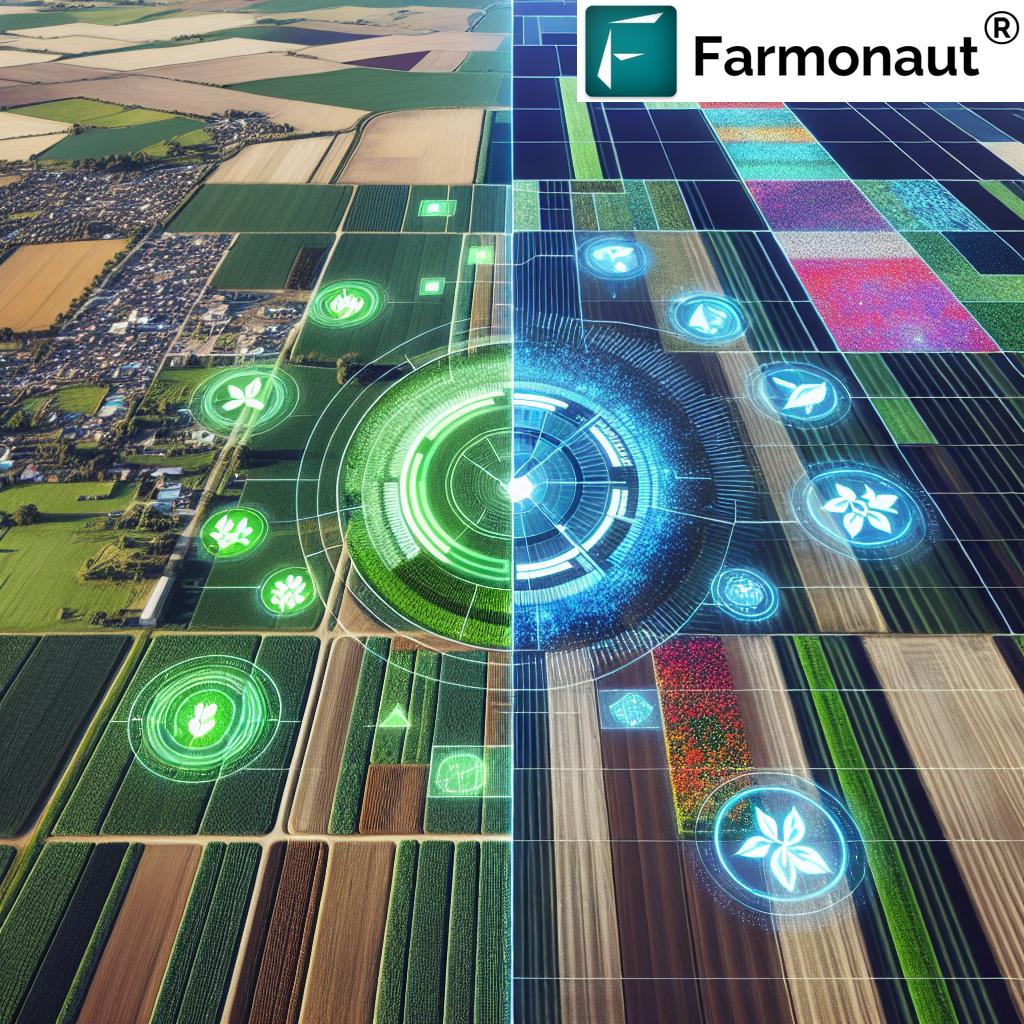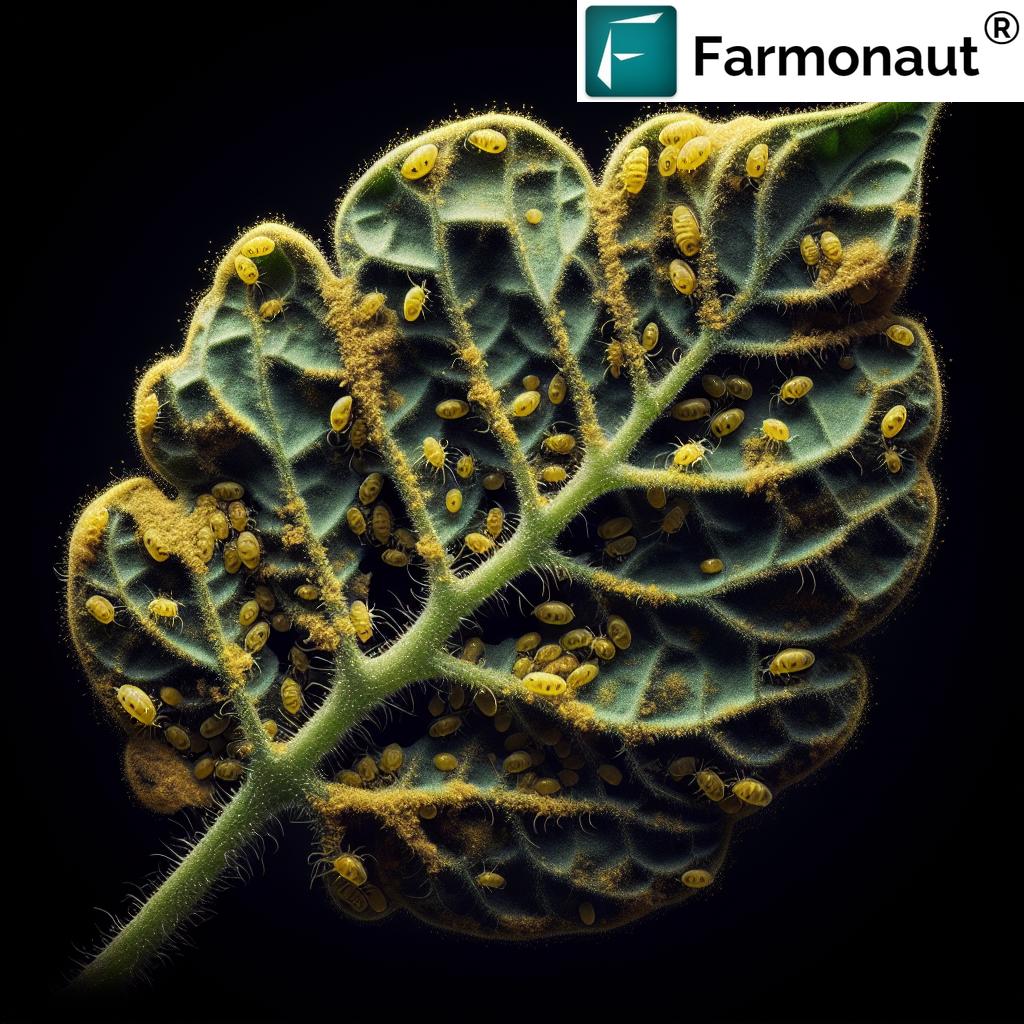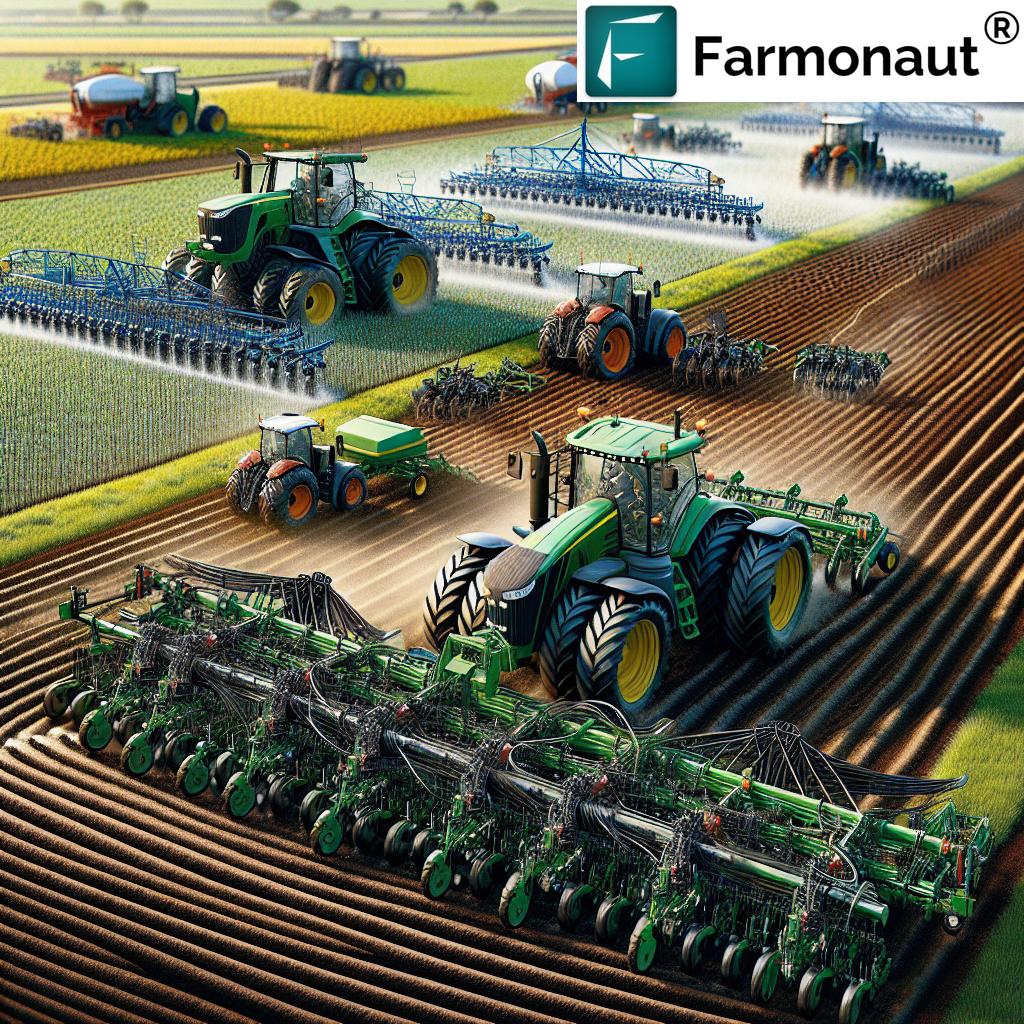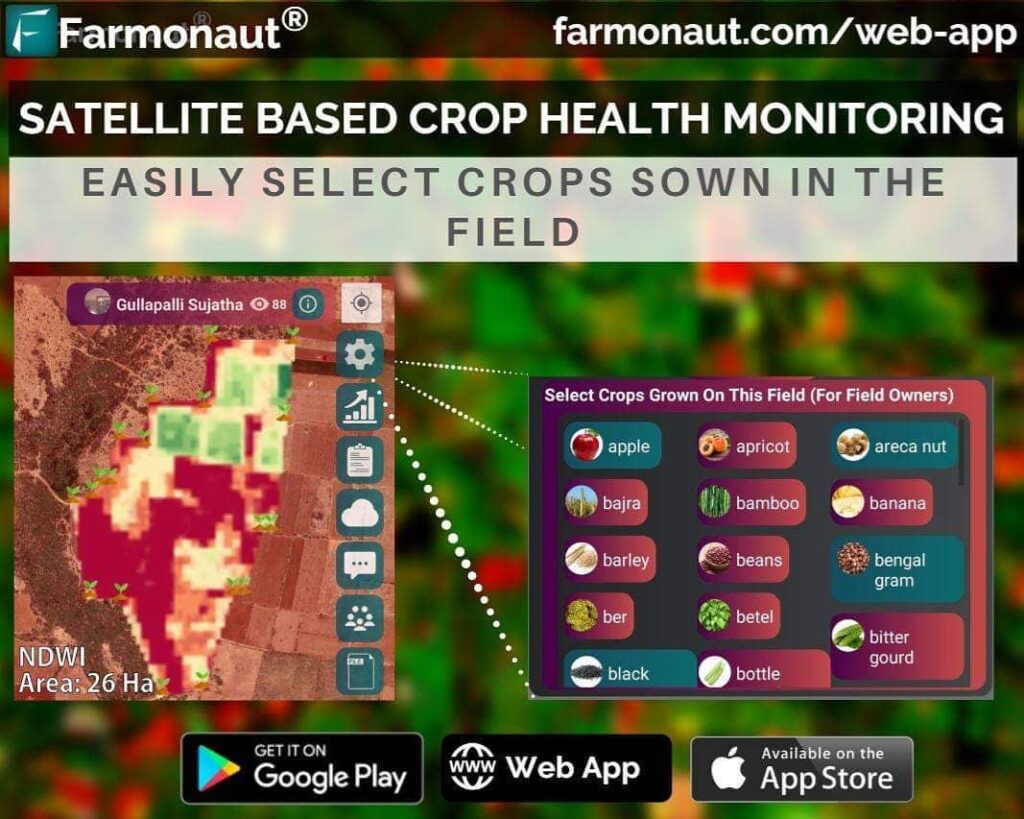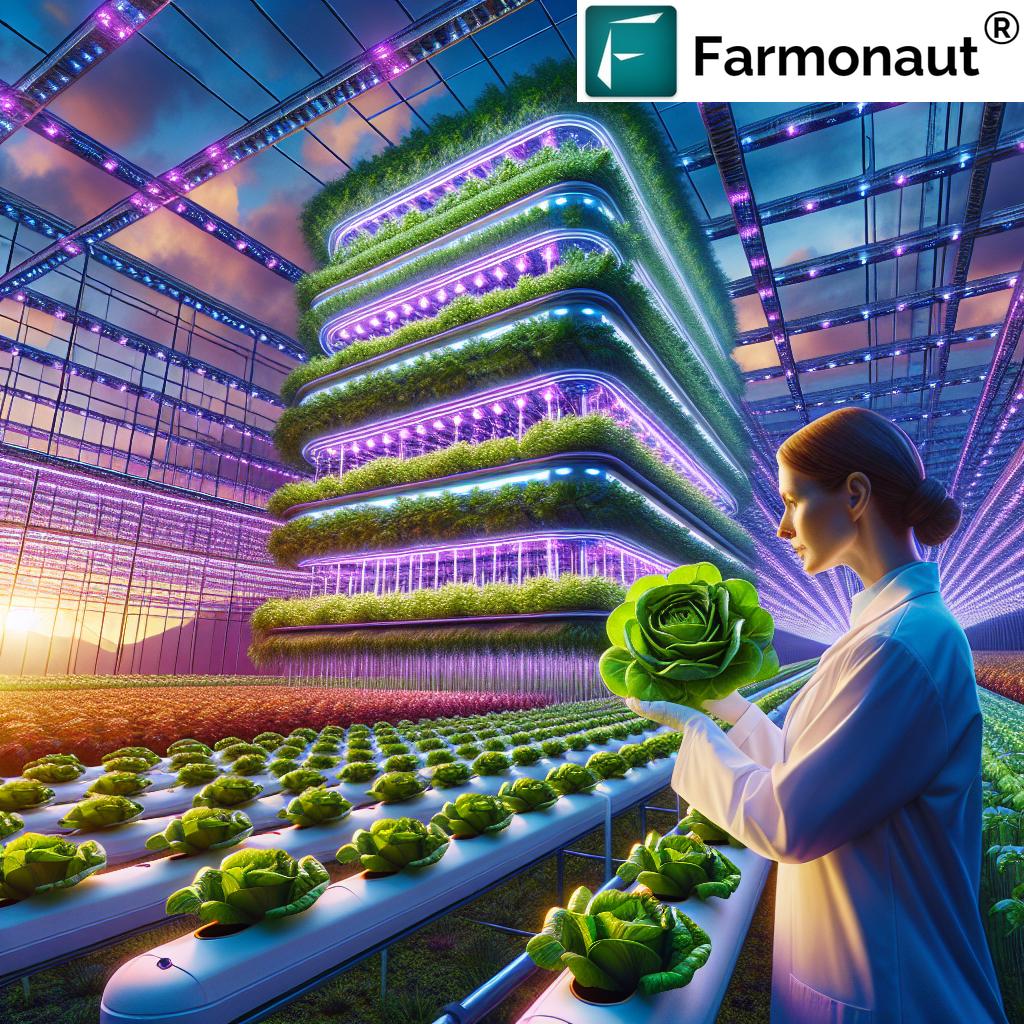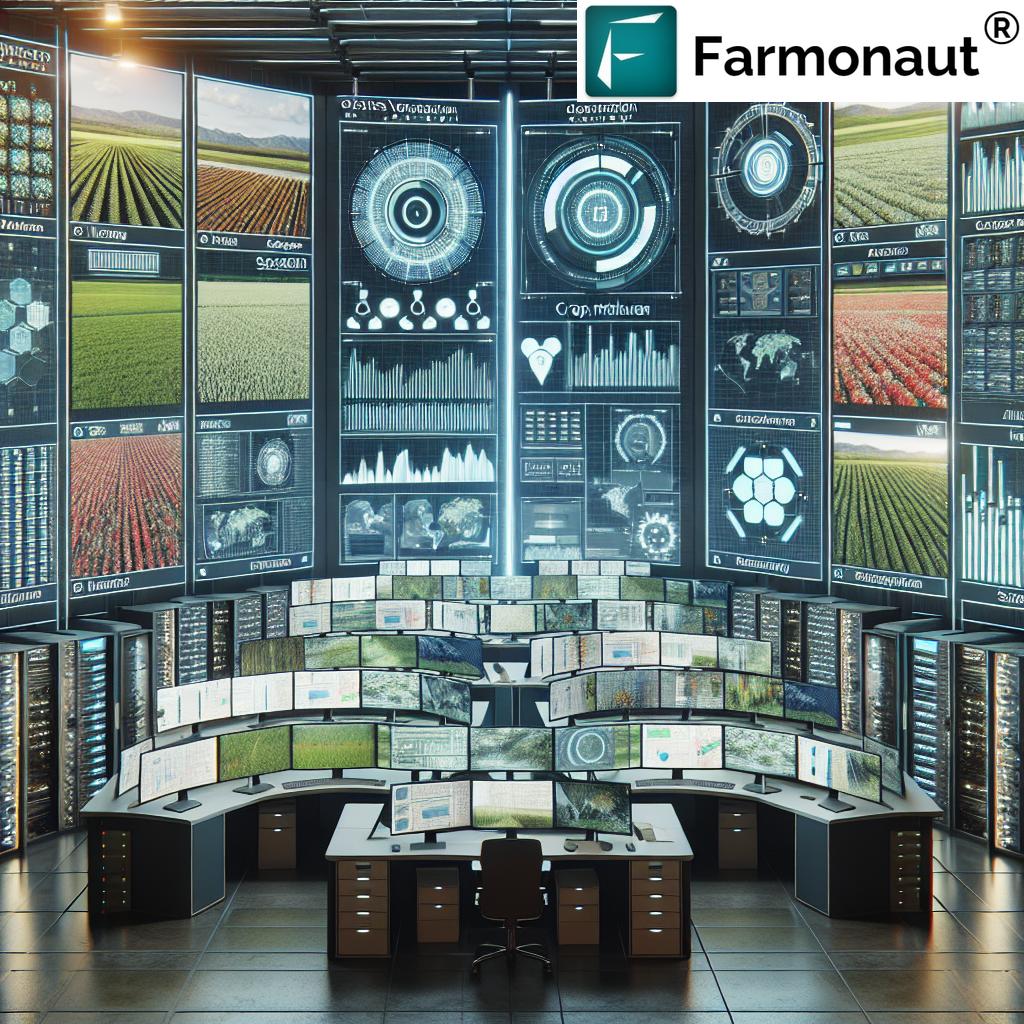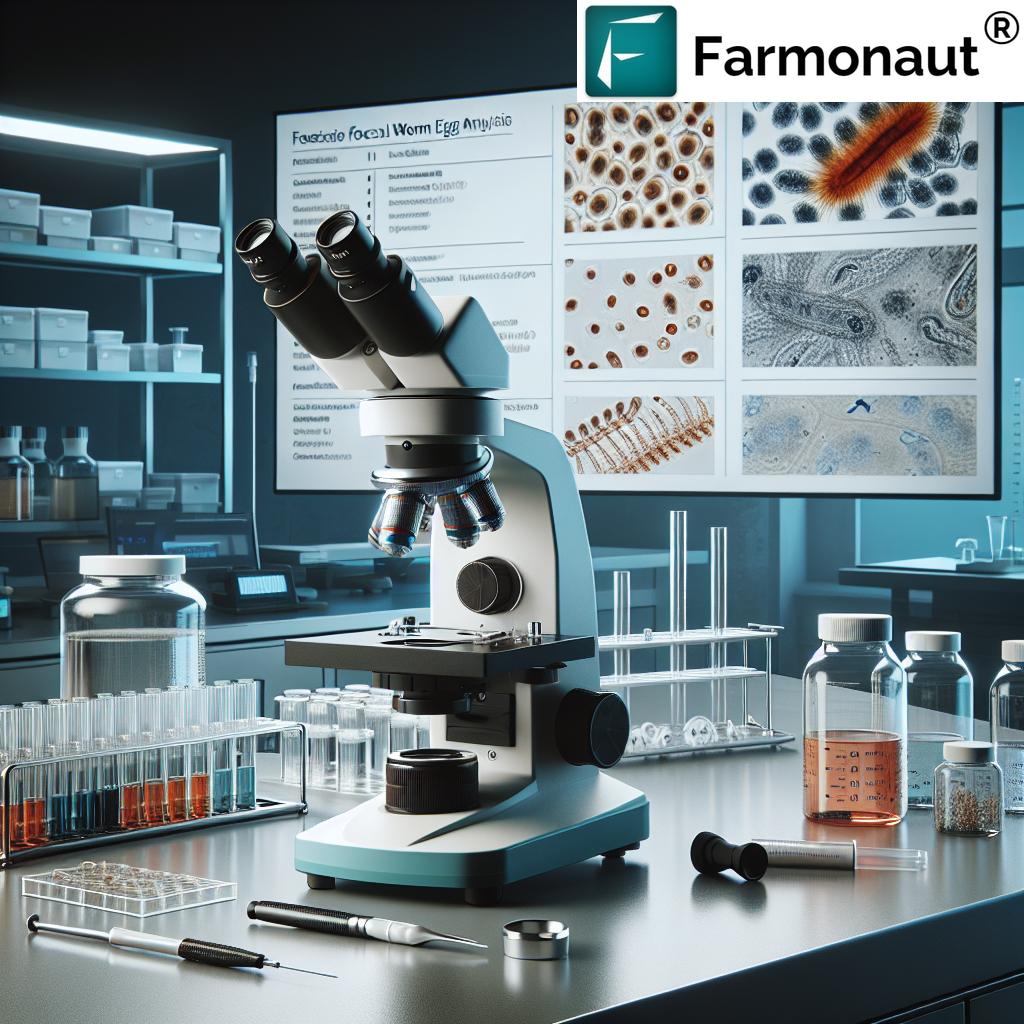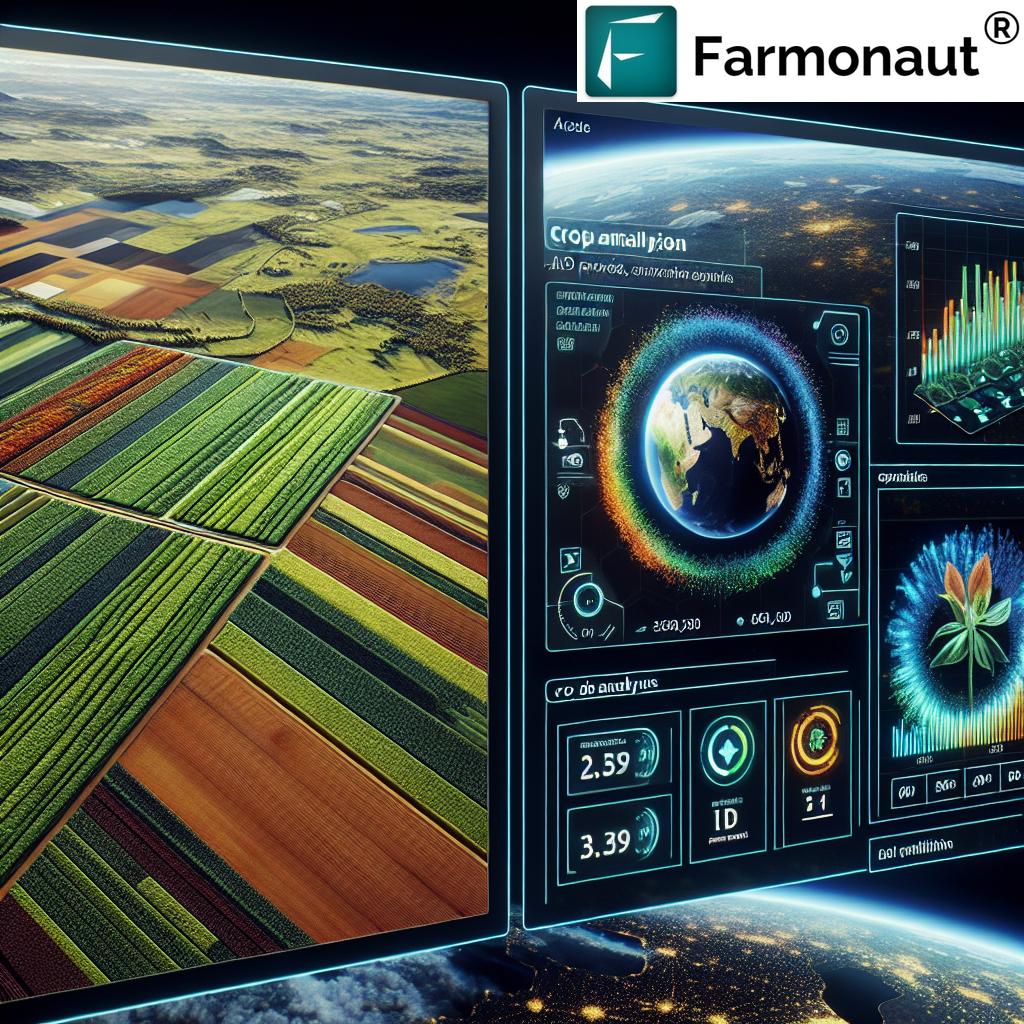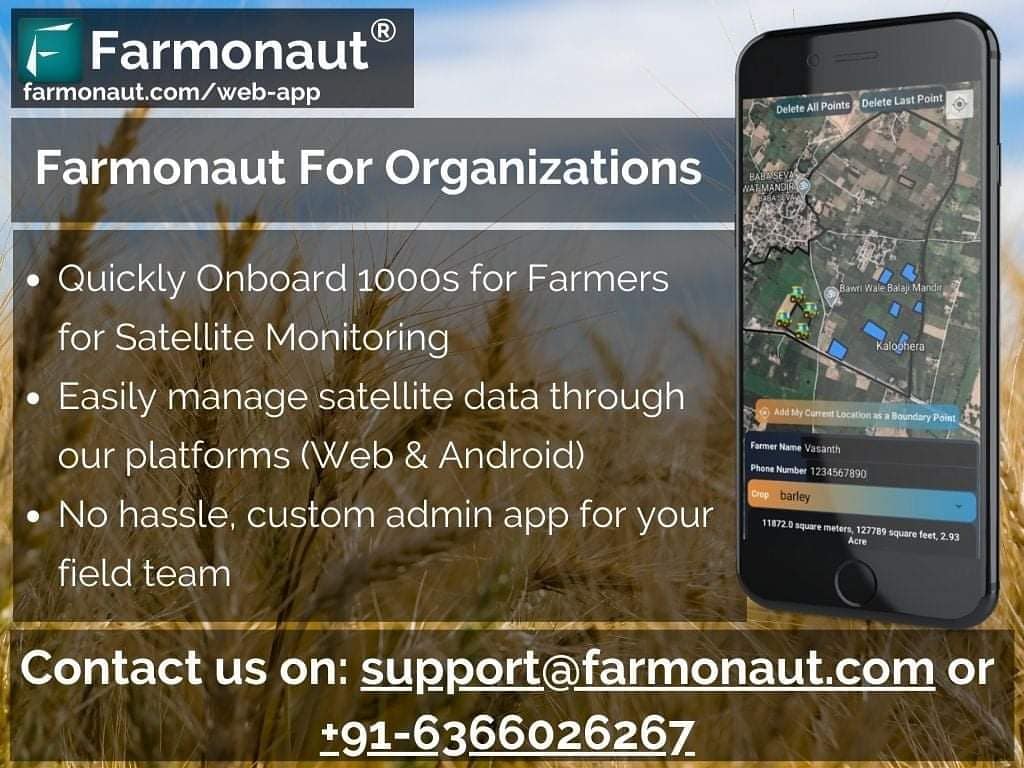Revolutionizing Agriculture: The Power of Satellite Monitoring and Precision Farming
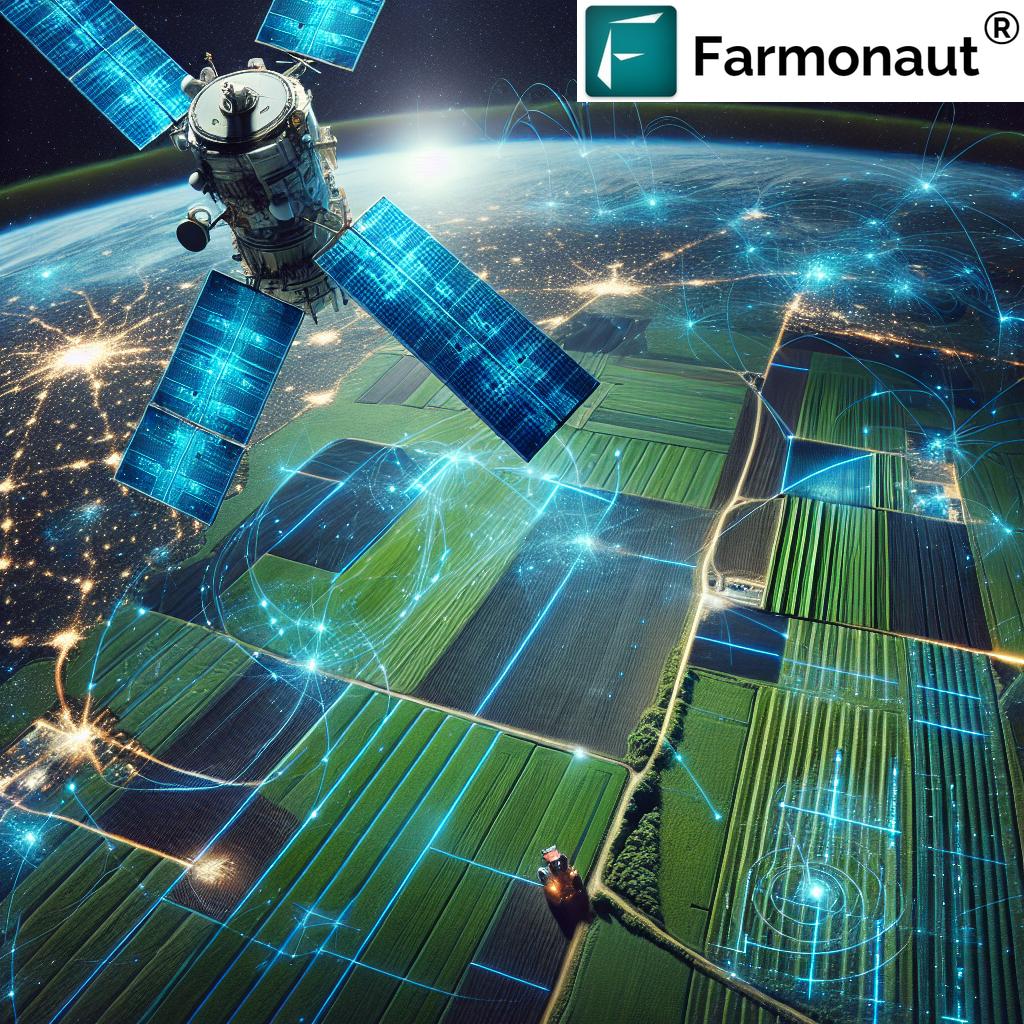
In the ever-evolving landscape of modern agriculture, we are witnessing a remarkable transformation driven by cutting-edge technologies. At the forefront of this revolution is precision agriculture, a concept that has redefined how we approach crop management, land monitoring, and resource utilization. As pioneers in this field, we at Farmonaut are proud to be at the helm of this agricultural renaissance, leveraging the power of satellite technology and data-driven insights to empower farmers and revolutionize the industry.
The Dawn of Precision Agriculture
Precision agriculture represents a paradigm shift in farming practices, moving away from traditional, uniform approaches to a more tailored, data-centric methodology. This innovative approach allows farmers to make informed decisions based on real-time data, optimizing every aspect of their agricultural operations. Let’s delve into the core components that make precision agriculture a game-changer in the modern farming landscape.
Satellite Monitoring: A Bird’s Eye View of Agricultural Lands
One of the most transformative technologies in precision agriculture is satellite monitoring. This advanced system provides farmers with an unprecedented view of their fields, offering insights that were previously unimaginable. Here’s how satellite monitoring is revolutionizing crop management:
- Real-time Crop Health Assessment: Satellite imagery allows us to analyze vegetation indices like NDVI (Normalized Difference Vegetation Index), providing a clear picture of crop health across vast areas.
- Early Detection of Issues: By regularly monitoring fields, we can identify potential problems such as pest infestations, diseases, or nutrient deficiencies before they become severe.
- Precision in Resource Allocation: With detailed insights into field variability, farmers can apply inputs like water, fertilizers, and pesticides precisely where and when they’re needed most.
- Yield Prediction: Advanced algorithms can analyze satellite data to predict crop yields, helping farmers and agribusinesses make informed decisions about harvesting and market strategies.
Our satellite monitoring system at Farmonaut takes this technology to the next level, offering farmers an easy-to-use platform that translates complex data into actionable insights. By visiting our application, farmers can access this powerful tool and start transforming their agricultural practices.
Soil Data: The Foundation of Precision Farming
Understanding soil health is crucial for optimal crop growth and sustainable farming practices. Precision agriculture leverages advanced soil data analysis to provide farmers with a comprehensive understanding of their land’s potential. Here’s how soil data contributes to precision farming:
- Soil Composition Analysis: Detailed soil tests reveal the nutrient content, pH levels, and organic matter in different parts of the field.
- Moisture Monitoring: Advanced sensors and satellite data help track soil moisture levels, enabling precise irrigation scheduling.
- Organic Carbon Measurement: Understanding the organic carbon content in soil is crucial for assessing soil health and implementing sustainable farming practices.
- Nutrient Mapping: Creating detailed maps of soil nutrient distribution allows for targeted fertilizer application, reducing waste and improving crop yield.
By integrating soil data with satellite monitoring, we at Farmonaut provide farmers with a holistic view of their agricultural land, enabling them to make decisions that are not only profitable but also environmentally sustainable.
The Role of Weather Data in Precision Agriculture
Weather conditions play a crucial role in agricultural success, and precision farming takes this into account with advanced weather monitoring and prediction systems. Our approach integrates real-time weather data and forecasts to help farmers make timely decisions:
- Micro-climate Analysis: Understanding local weather patterns helps in optimizing planting and harvesting schedules.
- Frost and Heat Stress Predictions: Early warnings about extreme weather conditions allow farmers to take preventive measures to protect their crops.
- Rainfall Forecasting: Accurate precipitation predictions help in planning irrigation and other field activities.
- Wind Pattern Analysis: This is crucial for activities like pesticide application and pollination management in certain crops.
Our weather API, accessible at Farmonaut Satellite API, provides developers and businesses with robust weather data to integrate into their agricultural solutions.
Field Boundaries and Management
Precision agriculture relies heavily on accurate field boundary mapping. This aspect of farm management has been revolutionized by satellite technology and GPS systems. Here’s how modern field boundary management enhances agricultural practices:
- Accurate Area Measurement: Precise field size calculations help in determining exact input requirements and potential yield.
- Zone Management: Fields can be divided into management zones based on soil type, topography, and crop performance history.
- Efficient Resource Allocation: Knowing exact field boundaries allows for precise application of seeds, fertilizers, and pesticides.
- Automated Machinery Guidance: GPS-guided machinery can operate within defined field boundaries, improving efficiency and reducing operator fatigue.
Our platform at Farmonaut offers advanced field boundary mapping tools, integrating seamlessly with other precision agriculture features to provide a comprehensive farm management solution.
The Impact of Precision Agriculture on Crop Yield and Quality
The ultimate goal of precision agriculture is to improve crop yield and quality while optimizing resource use. Here’s how this innovative approach is making a significant impact:
- Increased Crop Yields: By optimizing every aspect of crop management, precision agriculture can significantly boost yields.
- Improved Crop Quality: Targeted interventions based on real-time data lead to healthier crops and better-quality produce.
- Resource Efficiency: Precision application of water, fertilizers, and pesticides reduces waste and environmental impact.
- Sustainable Farming Practices: By minimizing resource use and optimizing land management, precision agriculture promotes sustainability in farming.
At Farmonaut, we’ve seen firsthand how our precision agriculture tools have helped farmers achieve remarkable improvements in their crop yields and overall farm productivity.
The Role of AI and Machine Learning in Agronomic Decisions
Artificial Intelligence (AI) and Machine Learning (ML) are playing an increasingly important role in precision agriculture. These technologies are revolutionizing how agronomic decisions are made:
- Predictive Analytics: AI algorithms can predict crop yields, pest outbreaks, and optimal harvest times based on historical and real-time data.
- Automated Crop Health Assessment: Machine learning models can analyze satellite images to detect crop stress, diseases, and nutrient deficiencies automatically.
- Personalized Recommendations: AI-powered systems can provide tailored advice on crop management based on specific field conditions and farmer goals.
- Data Integration: AI helps in integrating and analyzing data from various sources like satellites, weather stations, and soil sensors to provide comprehensive insights.
Our Jeevn AI Advisory System at Farmonaut is a prime example of how AI can be harnessed to provide farmers with personalized, data-driven advice for optimal crop management.
Precision Agriculture in Different Agricultural Sectors
While often associated with crop farming, precision agriculture techniques are being adopted across various agricultural sectors:
Grain Production
In grain farming, precision agriculture helps in optimizing seeding rates, fertilizer application, and harvest timing. Variable rate technology ensures that inputs are applied at the right rate in the right place, maximizing yield potential while minimizing waste.
Fruit and Vegetable Cultivation
For high-value crops like fruits and vegetables, precision agriculture enables micro-management of irrigation, precise pest control, and optimal harvest scheduling, leading to improved quality and higher market value.
Livestock Management
In the livestock industry, precision agriculture techniques are used for pasture management, animal tracking, and health monitoring. Satellite data helps in assessing grazing lands and planning rotational grazing strategies.
Forestry
Precision forestry uses satellite imagery and LiDAR technology for forest inventory, monitoring forest health, and planning sustainable logging operations.
The Economic Benefits of Precision Agriculture
The adoption of precision agriculture techniques offers significant economic benefits to farmers and the agricultural industry as a whole:
- Cost Reduction: By optimizing the use of inputs like fertilizers, water, and pesticides, farmers can significantly reduce their operational costs.
- Increased Revenue: Higher crop yields and improved crop quality lead to better market prices and increased overall revenue.
- Risk Mitigation: Early detection of crop health issues and precise weather forecasting help in reducing crop losses due to diseases, pests, or adverse weather conditions.
- Improved Farm Management: Data-driven decision-making leads to more efficient farm operations and better long-term planning.
Our solutions at Farmonaut are designed to maximize these economic benefits, making precision agriculture accessible and profitable for farmers of all scales.
Environmental Impact and Sustainability
Precision agriculture is not just about improving yields and profits; it’s also a key player in promoting sustainable farming practices:
- Reduced Chemical Use: Targeted application of pesticides and fertilizers minimizes environmental pollution and helps preserve biodiversity.
- Water Conservation: Precision irrigation systems based on real-time soil moisture data significantly reduce water wastage.
- Soil Health Preservation: By optimizing input use and promoting practices like variable rate fertilization, precision agriculture helps in maintaining long-term soil health.
- Carbon Footprint Reduction: Efficient use of machinery and reduced input application contribute to lowering the carbon footprint of agricultural operations.
At Farmonaut, we’re committed to promoting these sustainable practices through our advanced monitoring and management tools.
The Future of Precision Agriculture
As we look to the future, the potential of precision agriculture continues to expand. Here are some trends and developments we’re excited about:
- Integration of IoT Devices: The Internet of Things (IoT) will play a bigger role in collecting real-time data from fields, further enhancing the precision of agricultural practices.
- Advancements in Satellite Technology: Higher resolution satellite imagery and more frequent data updates will provide even more detailed insights into crop and soil conditions.
- Robotics and Automation: Autonomous farm equipment guided by precision agriculture data will become more common, increasing efficiency and reducing labor costs.
- Blockchain in Agriculture: Blockchain technology will enhance traceability in the food supply chain, providing consumers with detailed information about their food’s journey from farm to table.
We at Farmonaut are continuously innovating to stay at the forefront of these advancements, ensuring that our farmers have access to the most cutting-edge precision agriculture tools.
Comparison: Traditional Methods vs. Farmonaut Satellite System
| Aspect | Traditional Methods | Farmonaut Satellite System |
|---|---|---|
| Crop Monitoring | Manual field scouting, time-consuming and limited coverage | Real-time, comprehensive monitoring of entire fields with high-resolution satellite imagery |
| Soil Analysis | Periodic soil sampling, limited data points | Continuous soil health monitoring, detailed spatial analysis |
| Weather Data | Reliance on general weather forecasts | Field-specific micro-climate analysis and accurate weather predictions |
| Field Mapping | Manual mapping, prone to errors | Precise GPS-based field boundary mapping and management zoning |
| Precision Agriculture | Limited implementation due to lack of detailed data | Comprehensive data-driven precision farming capabilities |
| Data Accuracy | Variable, dependent on manual observations | High accuracy with advanced satellite and AI-driven analytics |
| Time Efficiency | Time-consuming manual processes | Rapid data collection and analysis, saving significant time |
| Cost-Effectiveness | High labor costs, potential for inefficient resource use | Reduced labor costs, optimized resource utilization leading to overall cost savings |
This comparison clearly illustrates the significant advantages of the Farmonaut Satellite System over traditional agricultural methods, highlighting its superiority in precision, efficiency, and cost-effectiveness.
Getting Started with Farmonaut
Ready to revolutionize your farming practices with precision agriculture? Here’s how you can get started with Farmonaut:
- Download Our App: Access our powerful tools right from your smartphone. Available on both Android and iOS platforms.
- Explore Our Web Platform: For a more comprehensive experience, visit our web application.
- Integrate Our API: Developers can leverage our robust API for custom solutions. Check out our API documentation for more details.
- Subscribe to Our Services: Choose a plan that fits your needs and start transforming your agricultural practices today.
Frequently Asked Questions (FAQ)
Q: What is precision agriculture?
A: Precision agriculture is an approach to farm management that uses information technology and a wide array of items such as GPS guidance, control systems, sensors, robotics, drones, autonomous vehicles, variable rate technology, GPS-based soil sampling, automated hardware, telematics, and software to optimize returns on inputs while preserving resources.
Q: How does satellite monitoring benefit farmers?
A: Satellite monitoring provides farmers with real-time data on crop health, soil moisture, and field conditions. This information allows for more precise decision-making in areas such as irrigation, fertilization, and pest control, ultimately leading to improved crop yields and resource efficiency.
Q: Is Farmonaut’s system suitable for small-scale farmers?
A: Yes, Farmonaut’s solutions are designed to be accessible and beneficial for farmers of all scales, including small-scale farmers. Our platform offers affordable options that can significantly improve farm management and productivity even for smaller operations.
Q: How accurate is the weather data provided by Farmonaut?
A: Farmonaut utilizes advanced weather models and satellite data to provide highly accurate, field-specific weather information. While no forecast is 100% accurate, our system offers significantly more precise and localized data compared to general weather forecasts.
Q: Can Farmonaut’s system work for different types of crops?
A: Yes, our system is versatile and can be applied to a wide range of crops, including grains, fruits, vegetables, and even in forestry applications. The platform is designed to provide valuable insights regardless of the crop type.
Q: How does precision agriculture contribute to sustainability?
A: Precision agriculture promotes sustainability by optimizing the use of resources such as water, fertilizers, and pesticides. This leads to reduced environmental impact, improved soil health, and more efficient land use, all contributing to more sustainable farming practices.
Q: What kind of support does Farmonaut offer to its users?
A: We offer comprehensive support to our users, including technical assistance, training on how to use our platform effectively, and expert agronomic advice. Our team is committed to ensuring that farmers can maximize the benefits of our precision agriculture tools.
Conclusion
As we navigate the challenges of modern agriculture, precision farming stands out as a beacon of innovation and sustainability. By harnessing the power of satellite technology, advanced data analytics, and AI-driven insights, we at Farmonaut are proud to be at the forefront of this agricultural revolution. Our commitment to making precision agriculture accessible and effective for farmers of all scales drives us to continually innovate and improve our services.
The future of agriculture is bright, with precision farming paving the way for more efficient, productive, and sustainable practices. As we continue to develop and refine our technologies, we invite farmers, agronomists, and agricultural enthusiasts to join us on this exciting journey. Together, we can cultivate a future where technology and nature work in harmony, ensuring food security and environmental sustainability for generations to come.
Embrace the power of precision agriculture with Farmonaut, and let’s grow towards a smarter, more sustainable future in farming.
